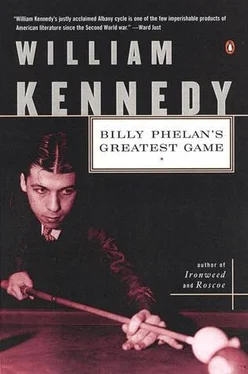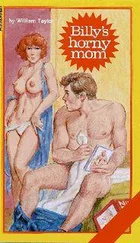Billy looked at Footers and laughed at the memory. Footers smiled and shook his head over the mousehole in Lemon’s character. Five minutes had passed since Lemon turned up the hole card.
“Thirty seconds, Lemon,” Nick said. “I give you thirty seconds and then you call it or the pot’s over.”
Lemon sat down and bit the bologna. He looked Billy in the eye as his time ticked away.
“You said it too fast when you bet,” Lemon said with a mouthful. “You probably got it.”
“I’ll be glad to show you,” Billy said.
“Yeah, well you’re good, you lucky bastard.”
“Ah,” said Billy, pulling in the pot at last. “My mother thanks you, my sister thanks you, my nephew thanks you, and above all, Lemon, I, William Francis Irish Catholic Democrat Phelan, I too thank you.”
And Billy shoved his hole card face down into the discards.
Lemon sulked, but life went on. Bump Oliver dealt and Billy came up with kings wired. Very lovely. Also Billy heard for the first time the unmistakable whipsaw snap of a real mechanic at work dealing seconds. Billy watched Bump deal, admiringly. Billy appreciated talent wherever he saw it. Nobody else seemed to notice, but the whipsaw was as loud as a brass band to Billy’s ear. It was not Billy’s music, however. He did not mind the music cheaters made, so long as they didn’t make it all over him. He caught Bump’s eye, smiled, and then folded the kings.
“No thanks,” was all he said to Bump, but it was plenty. Bump stopped looking at Billy and folded his own hand after the next card. He played two more hands and dropped out of the game. The cheater lost money. Never took a nickel from anybody, thanks to doughty Billy. Nobody knew Bump was really a wicked fellow at heart. Nobody knew either, how Billy absolutely neutralized him.
Billy, you’re a goddamned patent-leather wonder.
Martin arrived at the card game in time to see Lemon Lewis throw the deck across the room and hear Nick tell him, “Pick ’em up or get out. Do it again, I don’t want your action.” Lemon, the world’s only loser, picked up the cards and sat down, bent his shiny bald head over a new hand and continued, sullenly, to lose. Billy looked like a winner to Martin, but Morrie Berman had the heavyweight stack of cash.
“You’ve been doing all right, then,” Martin said, pulling a chair up behind Billy.
“Seem to be doing fine.” Half a glass of beer sat beside Billy’s winnings, his eyes at least six beers heavier than when Martin had last seen him.
“You coachin’ this fella, Martin?” Nick said.
“Doesn’t look to me as if he needs much coaching.”
“He’s got the luck of the fuckin’ Irish,” Lemon said.
“Be careful what you say about the Irish,” Footers said. “There’s Jews in this game.”
“So what? I’m a Jew.”
“You’re not a Jew, Lemon. You’re an asshole.”
“Up yours, too,” Lemon said, and he checked his hole card.
“Lemon, with repartee like that you belong on the stage,” Footers said, and he looked at his watch. “And there’s one leaving in ten minutes.”
“Play cards,” Nick said.
“The bet,” said Morrie, “is eighty dollars.”
“Eighty,” Nick said.
Morrie smiled and looked nothing like Isaac. He had a theatrical quality Martin found derivative-a touch of Valentino, a bit of George Raft, but very like Ricardo Cortez: dark, slick, sleek-haired Latin stud, as if Morrie had studied the type to energize his own image as a Broadway cocksmith and would-be gigolo, a heavy gambler, an engaging young pimp with one of the smartest whores on Broadway, name of Marsha. Marsha was still in business but had split with Morrie five years back and worked alone now. Pimping is enough to weight down a paternal brow, but Jake’s imputation of lead sluggery implied a far broader absence of quality in Morrie, and Martin could not see it.
What he saw was Morrie’s suavity, and an ominous reserve in that muscular smile which George Raft, at his most evil, could never have managed; for Raft was too intellectually soft, too ready for simple solutions. Morrie, like Cortez, and unlike the pliant, innocent Isaac, conveyed with that controlled smile that he understood thoroughly that life was shaped by will, wit, brains, a reverence for power, a sense of the comic; that things were never simple; and that the end of behavior was not action but comprehension on which to base action. George Raft, you are a champion, but how would you ever arrive at such a conclusion?
“K-K-K-Katy, he’s bettin’ me eighty,” sang Footers, and he folded. That left Nick, Billy, and Morrie with money to win. The pot fattened, and Nick cut it for the house.
The cellar door opened and a kid, twenty-two maybe, stepped in and was met by Nick’s doorman, the hefty Bud Bradt, an All-Albany fullback for Philip Schuyler High in the late twenties. The players looked up, saw the kid getting the okay from Bud, and went back to their cards. Then the kid came down the eight steps, stood with his back to the door that led to Nick’s furnace and coal bin, and, taking a small pistol from his sock, told the players: “Okay, it’s a holdup.”
“Cowboy,” Morrie said, and he reached for his cash.
“Don’t touch that, mister,” the kid said. “That’s what I came for,” and he threw a cloth bag on top of the pot. “Put your watches and rings in that.”
“This isn’t a healthy thing to do in Albany, young man,” Footers said to him. “They’ve got rules in this town.”
“Do what I say, Pop. Off with the jewelry and out with the wallets. Empty your pockets and then move over against that wall.” He pointed with his small pistol toward the bologna sandwiches.
The kid looked barely twenty to Martin, if that. Yet here he was committed to an irrevocably bold act. Psychopathic? Suicidal? Early criminal? Breadwinner desperate for cash? An aberrant gesture in the young, in any case. The kid’s shoulders were spotted with rain, a drizzle that had begun as Martin arrived. The kid wore a black fedora with brim down, and rubbers. A holdup man in shiny rubbers with large tongues that protected his shoelaces from the damp night. What’s wrong with this picture?
“Come on, move,” the kid said, in a louder voice. And Martin felt his body readying to stand and obey, shed wallet, watch, and gold wedding band bought and inscribed in Galway: Martin and Maire, Together. Never another like that. Give it up? Well, there are priorities beyond the staunchest sentiment. And yet, and yet. Martin contained his impulse, for the other players still stared at the kid and his.22 target pistol. Gentlemen, do you realize that psychopaths snap under stress? Are you snapping, young crazy? Is blood in the cards tonight? Martin envisioned a bleeding corpus and trembled at the possibilities.
And then Billy reached for the kid’s swag bag, picked it off the money pile, and threw it back at the gunny boy. Billy grabbed a fistful of cash from the pot and stuffed it into his coat. The kid stepped behind Bump Oliver’s chair and shoved the pistol into the light. “Hey,” he said to Billy, yelling. But Billy went back for a second handful of bills.
“That pea-shooter you got there wouldn’t even poison me,” he said.
Martin’s thought was: Billy’s snapped; the kid will kill him. But the kid could not move, his response to Billy lost, perhaps, inside his rubbers. The kid’s holding position deteriorated entirely with the arrival of a sucker punch to the back of his neck by Bud Bradt, a man of heft, yes, but also of stealth, who had been edging toward the kid from the rear and then made a sudden leap to deliver his massive dose of fist to the sucker spot, sending the kid sprawling over the empty chair, gun hand sliding through the money, gun clattering to the floor on the far side of the table. Lemon pulled the kid off the table, punched his face, and threw him to the floor. Then he and Morrie kicked the kid body in dual celebration of the vanquishing until Nick said, “Shit, that’s enough.” Bud Bradt took over, kicked the kid once more, and then lifted him by collar and leg up the stairs, a bleeding carcass.
Читать дальше












